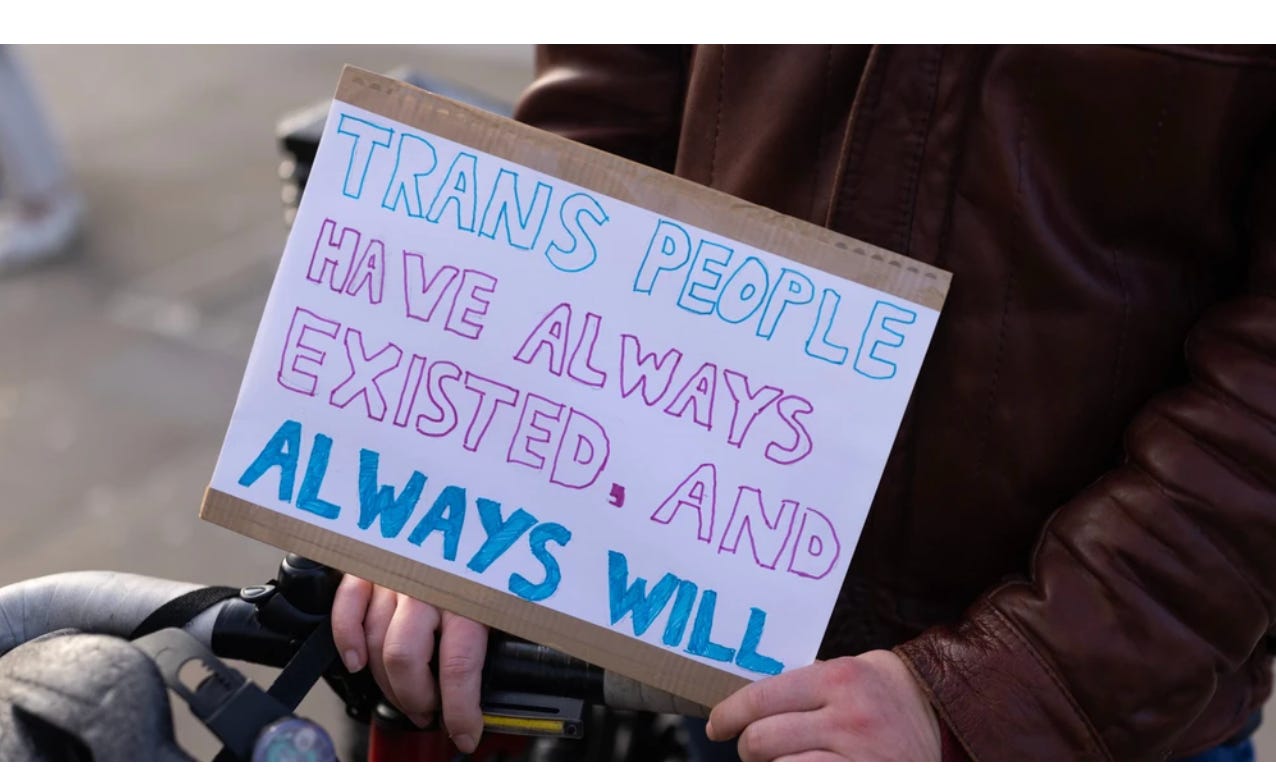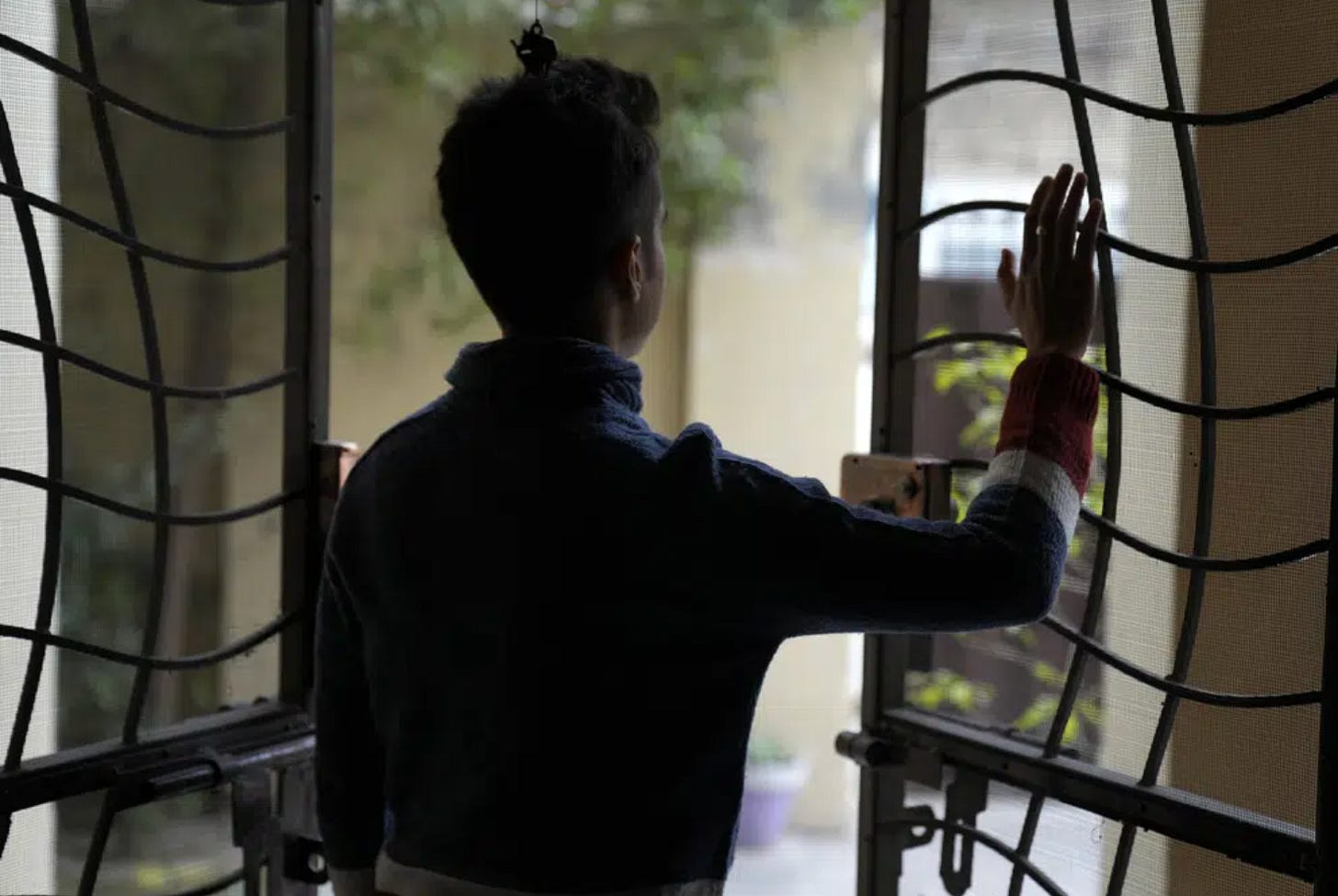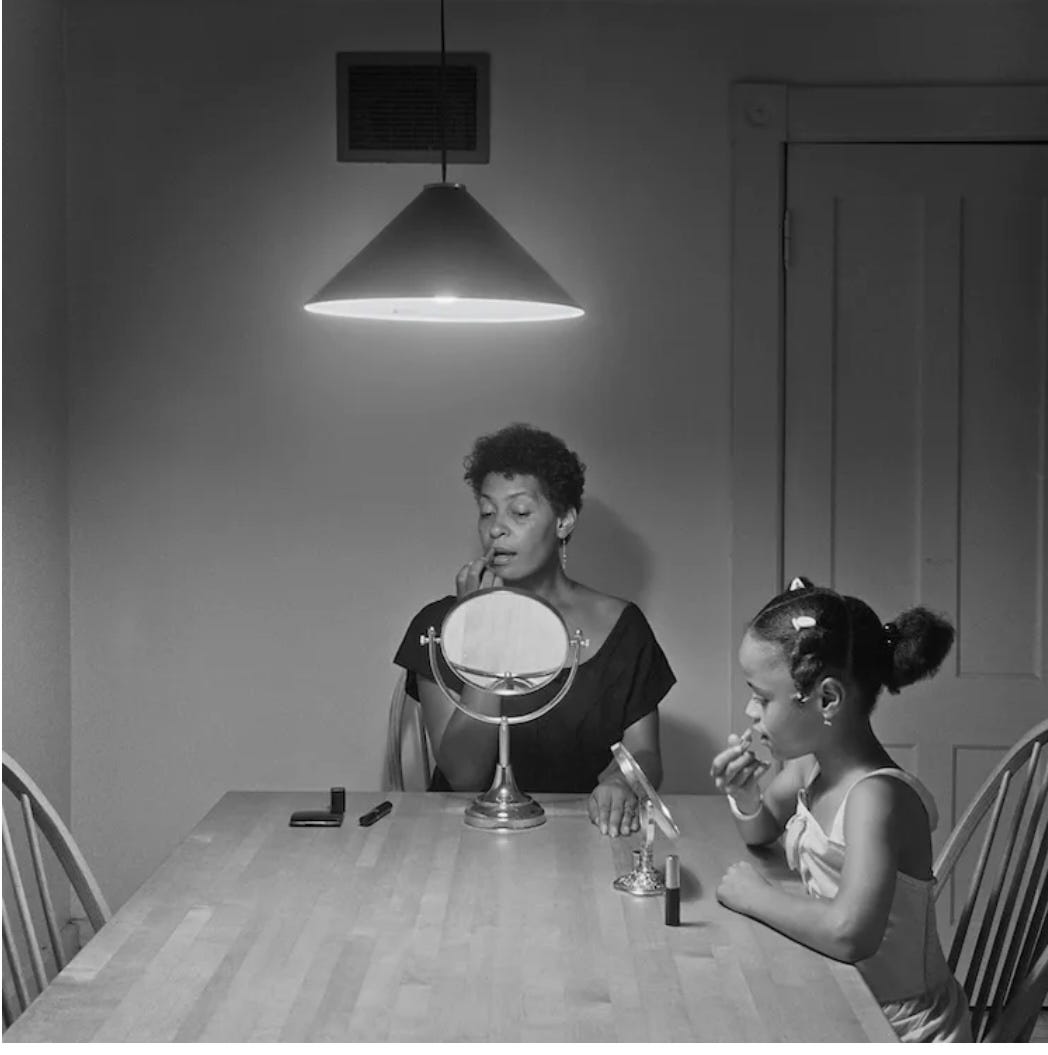Global Roundup: Trans People in the UK, Mexico Mother vs Femicide, Pakistan Trans Men, Nonbinary Artist Releases Album, Exhibition on Black Women & Leisure
Curated by FG Contributor Samiha Hossain
Trans rights activists protest outside Downing Street this week.Photo: Dan Kitwood/Getty Images via Vice.com
Trans people in the UK are increasingly leaving the country because of the constant transphobia they face online, on the streets, and at work. This comes as the UK government triggered a Section 35 order – for the first time ever – effectively blocking the Scottish government’s gender recognition law which would have made Scotland the first part of the UK to allow people to legally change their gender by self-declaration and without the need for medical diagnosis.
Emilia Beckers, a trans woman living in London, stepped outside and lived full-time as her true identity in April 2022. Now, she is packing up to move to Belgium. She said the UK government’s latest move is what pushed her, but that she had also battled rife transphobia for years. She says that the majority of trans people will not report incidents to the police because they know the police will be the last people to stand up for them.
Nobody understands the reality of living as a transgender person in England. There is a complete blackout of any positive trans reporting. Anything that hits mainstream news is 99 percent likely to be negative and hateful…-Emilia Beckers
A 29-year-old Black trans man who relocated to Greece asked to be anonymous as he does not want his family to know where he moved to. Before relocating to Greece, he moved from a village in the South of England to Birmingham. There, he worked as a personal trainer for a major gym chain, and he expected to be more accepted. He shares the daily transphobia he faced at work including his manager making it a game for him to guess who the trans person on the team is, and leaving female uniform packs out for him. He also got misgendered regularly.
Leaving the UK was the difference between me staying alive or not. In the UK, I was battling for my existence every single day, always fighting fake news about my identity. It’s so sad, but I completely ran out of steam just trying to be me. -29-year-old Black trans man
After several years of working in journalism and activism in England, Michelle Snow is unsure where to go. She says she knows many people who want to leave but are physically unable to – half of her friends want to leave. Of course, the ability to pack your bags and leave is a privilege that trans people further marginalized by race, class, immigration status and other factors are more likely to lack.
I feel like I’m being pushed away by the UK government, and I don’t think they know how awful that feels to trans people. Every few weeks I get this feeling like I’m not welcome here, and I’m just being used in some sort of political game. -Michelle Snow
A woman with the words "Not one less" written on her chest in Spanish joins an International Women's Day march in Mexico City on March 8, 2021. © Rebecca Blackwell, AP
Patricia Garcia’s 24-year-old daughter, Frida Santamaria Garcia, was left for dead after being robbed of her cell phone in June last year. Frida’s boyfriend, Juan Paulo, initially denied involvement in her death but suddenly retracted his denial and admitted that he shot his girlfriend, saying it was not intentional.
Paulo’s retraction and delayed confession prompted the regional public prosecutor's office to reduce the charges against him to involuntary homicide. This gave the accused the right to an abbreviated legal process and a three-year prison sentence with the possibility of parole. The punishment for involuntary homicide in Mexico is far more lenient than for those charged with femicide.
Garcia faced a harrowing legal obstacle course including not being informed that she had a right to see a victims' counselor. She says the “investigation was not carried out correctly, neither in substance, nor in form.” The family eventually solicited the help of NGOs, including the MAPAS feminist collective, which advised the family to talk to the press and organized demonstrations calling for justice for Frida. The group denounced the lack of proper police reports or witness testimonies. Meanwhile, the prosecutor's office insisted on treating her case as a possible suicide.
In Frida's case, there is another crucial fact that cannot be ignored: Juan Paulo is the son of the former mayor of Sahuayo city, Alejandro Amezcua Chavez. Chavez is himself the brother-in-law of Alfredo Inaya, a former secretary of economic development in the cabinet of the governor of Michoacán state. MAPAS quickly denounced the "cynicism" with which the judiciary was treating the case against such a well-connected suspect.
A week after the reduced charges for her daughter’s murderer were announced, Garcia said she has appealed the decision, despite the threats the family and several witnesses have faced, and despite attempts to torpedo the case by people linked to the suspect.
Mexico’s worsening gender violence crisis and the state’s failure to respond have led protesters and activists to call the country a “femicide nation.” On January 4, demonstrators gathered in front of the courthouse in Morelia, the capital of Michoacán state, declaring that every murder of a woman that goes unpunished is yet another example that Mexico is "a femicide nation.” They demanded the maximum sentence for Frida's alleged murderer, and for all the other femicide victims.
Pakistani trans man Aman, who asked not be identifiable in the photo, looks out at his home after an interview with The Associated Press, in Lahore, Pakistan, Friday, Dec. 2, 2022. (AP Photo/K.M. Chaudary)
Trans men in particular face deep isolation in Pakistan. The country has entrenched beliefs on gender and sexuality, so trans people are often considered outcasts. But trans women have a degree of toleration because of cultural traditions. Trans women in public office, on news programs, in TV shows and films, even on the catwalk, have raised awareness about a marginalized and misunderstood community.
Trans men, however, remain largely invisible, with little mobilization, support or resources. Trans women have growing activist networks — but, according to Aman, a 22-year-old trans man from Lahore, and others, they rarely incorporate or deal with trans men and their difficulties.
We are already disowned by our families and blood relatives, then the people we think are our people also exclude us. -Aman
Trans women have been able to carve out their space in the culture because of the historic tradition of “khawaja sira” – today, the term is generally associated with trans women.
Mani, a representative for the trans male community in Pakistan, set up a nonprofit group in 2018 because he saw nothing being done for trans men, their well-being or mental health.
Trans people have seen some progress in protecting their rights. Supreme Court rulings allow them to self-identify as a third gender, neither male nor female, and have underscored they have the same rights as all Pakistani citizens.
Although Mani was involved in the trans rights bill, most lobbying and advocacy work has been from transgender women since it became law.
Nobody talks about trans men or how they are impacted by the act. But this is not the right time to talk about this because of the campaign by religious extremists (to veto changes to the act). I don’t want to cause any harm to the community. -Mani
Another reason for trans men’s low visibility is that those assigned female at birth are forced to lead a more restricted life than males in Pakistan. Family honor is tied to the behavior of women and girls, so they have less room to behave outside society’s norms. Aman had nobody to speak to about his gender identity struggles. He used social media and search engines, making contact with a trans man in India who connected him with a WhatsApp group of trans men in Pakistan. Aman grew his hair long and dressed like a girl “just to survive” while still at home, he said.
These restrictions created a war in my mind. You have to socialize, and it was difficult for me because I had to socialize as a girl. -Aman
Aman was disowned once he was outed by family, so he moved out and started living fully as a man. Mani has helped, giving him an office job at the non-governmental organization. He still has not changed his gender to male officially on his ID card, which he needs to vote, open a bank account, apply for jobs and access government benefits including health care. When he went once to NADRA, the government agency responsible for ID cards, the officials harassed him.
Evidently trans men in Pakistan face a unique set of challenges and at times feel isolated from the trans community. It is important to center their struggles in the wider LGBTQ+ movement.
Jibril Yassin via them.us
Maryam Said is a Canadian nonbinary singer-songwriter better known as Poolblood. Their debut album Mole, out this month, is an alterna-folk record, co-produced by queer indie musician Shamir. Thematically, the album tackles co-dependency and Said’s issues with people-pleasing. The 27-year-old-musician has deep insight into relationship patterns that no longer serve them, and they worked to foster feelings of self-love as they crafted the album. Them interviewed Said about their full-length debut and their nonbinary identity.
I suffer from people-pleasing tendencies. So, I think in this record, I was trying to navigate taking care of myself. I thought the best place for me to feel vulnerable and honest about myself was to write these songs and to find true connection through them and to have people to connect with the music. -Maryam Said
On the song “Twinkie,” Said sings, “I know I’m not the same. I know I’m not my yesterdays, and the future is a distant light.” They say the lyrics speak to their acceptance of their nonbinary identity. They said they have alway known about their nonbinary identity but it took some time to figure out the words for it and how to categorize it.
I wanted to write that I could see a future where I was going to be myself and step into the sunlight and allow myself to be free of all that judgment and just be that person that I always deemed myself to be. -Maryam Said
Said speaks about connecting with many other queer artists in Toronto. They say that the scene can be very white and straight, so they are compelled to hold on to those who fall outside of those categories.
With queer friendships, there’s space to not only be yourself, but also be loving and present in a way that doesn’t have these gender roles. You just get to be tender. -Maryam Said
The reason Said started playing music is because they love singing so much – they say it is where they feel at home with themselves. This is clearly true for their record Mole where they are vulnerable about their experiences – something that is undoubtedly meaningful to nonbinary listeners especially.
Carrie Mae Weems, "Untitled (Woman and Daughter with Make Up)," 1990. © Carrie Mae Weems. Courtesy of the artist and Jack Shainman Gallery, New York.
Resting Our Eyes is an exhibition in ICA San Francisco with the central theme of relaxation and ornamentation as avenues for Black women’s freedom. It features pieces from Carrie Mae Weems, Mickalene Thomas, Lorna Simpson, and many other art-world heavy weights. Tahirah Rasheed and Autumn Breon—two California-based curators—believe that “Black women’s adornments are radical forms of self-love, expression, and activism.”
When we started thinking about what kind of story we would want to tell for this exhibition, we kept coming back to the [queer Black feminist organization] Combahee River Collective’s idea of how the entire world benefits from Black women’s freedom. -Autumn Breon
While sussing out which artists and pieces would be included in the exhibition, the two curators kept coming back to the idea of featuring works that highlighted the beauty in the mundane. That concept is embodied in Thomas’s “Love’s Been Good To Me #2,” a large-scale painting of a Black woman draped in an evening gown with a high slit.
Both Rasheed and Breon have unconventional backgrounds, at least when it comes to art. Rasheed, a Bay Area native whose parents were members of the Black Panther party, attended college at the University of California, Berkeley, where she studied medicine, integrative biology, and biomedical sciences. Breon majored in aeronautics and astronautics at Stanford University. Both have always used art as a form of activism and civic engagement—tenets of Black feminism, but also an important cultural facet of the San Francisco Bay Area. As such, the women have begun living out the topics they explore in Resting Our Eyes.
Both of our practices are centered in abolition. And abolition is an entire framework that applies to how we work with each other. What’s central to that is facilitating care and not harm with the power you have. That’s something I hope people get from this: not only taking in these objects, but also thinking about how you can organize your life around those ideas. -Autumn Breon
Samiha Hossain (she/her) is a student at the University of Ottawa. She has experience working with survivors of sexual violence in her community, as well as conducting research on gender-based violence. A lot of her time is spent learning about and critically engaging with intersectional feminism, transformative justice and disability justice.
Samiha firmly believes in the power of connecting with people and listening to their stories to create solidarity and heal as a community. She refuses to let anyone thwart her imagination when it comes to envisioning a radically different future full of care webs, nurturance and collective liberation.






